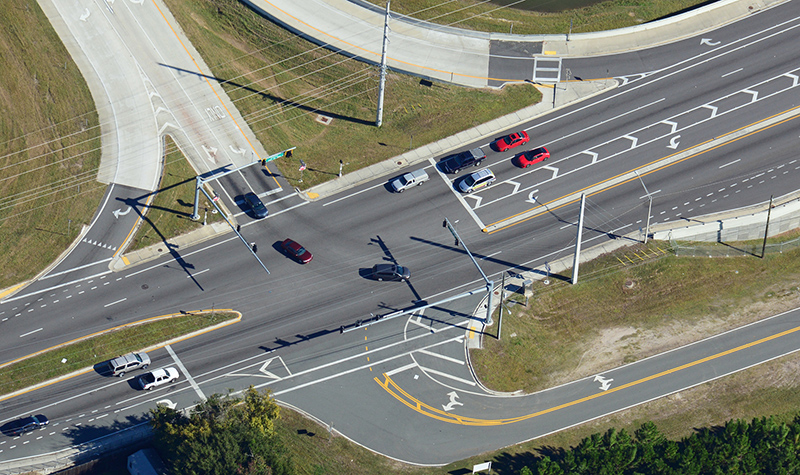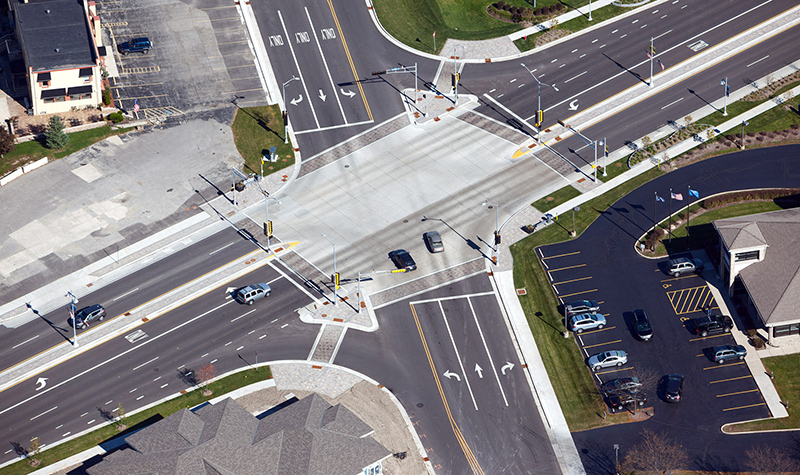Concrete vs. Asphalt: What’s the Best Roadway Surface?
Budgets for roadways are tight, and elected officials have to seek the most value for limited construction and maintenance dollars. Unlike homeowners contemplating a new driveway, municipalities may be looking at miles of surface that must safely accommodate hundreds of vehicles a day. So which is the best investment, asphalt or concrete?

About the Expert:
Mark Petersen has been a project manager for more than 10 years. His primary responsibilities include project management, rural and urban state highway design, report preparation, utility coordination, and agency coordination. He has written several pavement type selection reports.
When Is Concrete the Best Roadway Choice?
- Concrete holds up better under heavy loads. Think of the heavy truck traffic on our interstate system, and it’s easy to understand why state departments of transportation tend to go with concrete on interstates.
- Concrete usually requires fewer repairs, making it a good choice for city streets with heavier traffic volumes. Less maintenance means fewer interruptions in traffic and fewer demands on budget.
- Concrete can be stamped and/or colored to increase safety at crosswalks or add to the overall attractiveness of a setting.
- Concrete road surfaces last longer – as much as 25 years, compared to 18 for asphalt. With proper care, both surfaces could last as long as 40 years, but concrete will require less maintenance.
So Why Not Just Go with Concrete?
- Concrete is more expensive than asphalt, and the initial cost may be more than local budgets can justify.
- Concrete can be noisier: The surface is roughened during construction to provide good tire grip. Over time the slabs of concrete shift or settle slightly, producing a rhythmic sound that many motorists find annoying.
- Concrete may be subject to pockmarking in areas with freeze-thaw cycles, especially if the locally available aggregate that goes into the concrete mix has a high “chert” content. Chert is a type of rock that tends to collect moisture. During the freeze-thaw cycles the chert expands and pops out of the pavement, leaving holes that just get worse over time.
- Concrete – when new – may be damaged by salt used to reduce road icing. Some agencies opt for a no-salt approach for the first one or two winters. That’s a concern in areas subject to frequent road icing.
- Concrete can be more expensive and more difficult to repair. Instead of patching a problem area, workers usually must remove a slab of the roadway and replace it with new material concrete. The same is true if there are utilities under the roadway that need replacement or repair. Removing the road surface and installing new material is more difficult and expensive than the same work on an asphalt roadway.

When Is Asphalt the Best Roadway Choice?
- Asphalt is less expensive to install, with the exception of periods of petroleum price spikes, during which the costs of the two pavement types are comparable.
- Asphalt is simpler to repair; most counties, townships, and smaller communities will have the equipment needed to patch holes in asphalt surfaces.
- Asphalt is easier, faster, and less expensive to remove and replace in order to gain access to utilities under the roadway.
- Asphalt pavement offers advantages in areas that receive snow. The pavement warms up as sunlight hits a plowed roadway, melting snow left behind by plows. Asphalt roads also tolerate salt better than new concrete surfaces.
- Asphalt provides better traction and skid resistance for vehicles.
So Why Not Just Go with Asphalt?
- Asphalt is prone to tearing and rutting on roadway segments with high turning movements and stopping points.
- Asphalt may crack in extreme cold and rut in extreme heat if the wrong oil is used in the asphalt mix. The result is a roadway surface that is sure to prompt complaints from motorists.
- Asphalt has a lower life expectancy than concrete – about 18 years compared to concrete’s 25. Although both surfaces can last as long as 40 years, asphalt will require more maintenance.
The initial cost of installation, the cost of maintenance and eventual replacement, location of underground utilities, type and volume of traffic – all these factors and more should be considered when deciding between concrete and asphalt for road projects.
If you have questions about making the concrete vs. asphalt decision, contact Mark Petersen or one of our other transportation experts.


Post a comment: